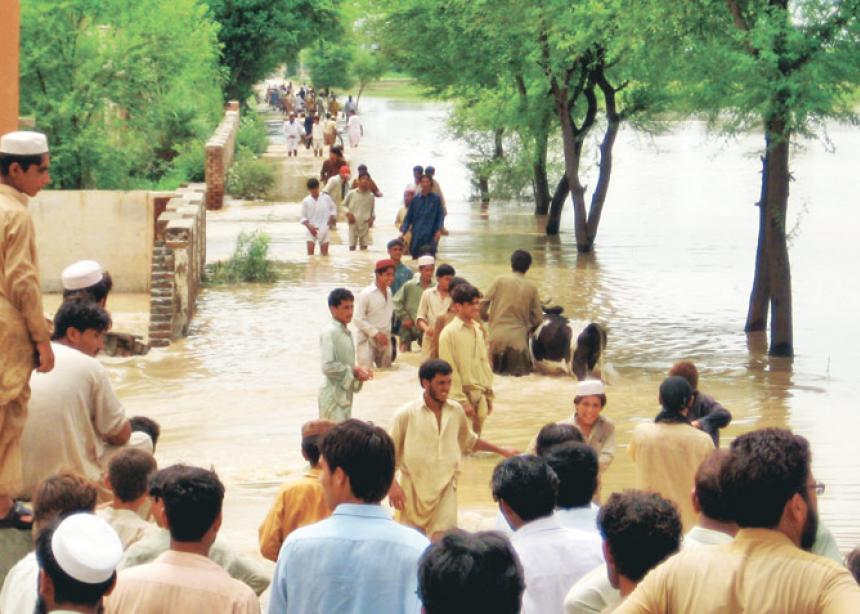Pakistan’s worst floods in eight decades have killed more than 1,600 people and disrupted the lives of more than 14 million—about 8 percent of the population. With hundreds of thousands of homes already destroyed in what the National Management Authority is calling “the worst disaster in Pakistan’s history,” people there are in immediate need of basic necessities. About two million people are homeless and there are fears that outbreaks of water-borne diseases such as cholera could create a health crisis.
The floods, which began in late July after heavy monsoon rain deluged the upper reaches of the Indus River basin, have ploughed a swathe of destruction more than 1,000 kilometres long.
“The floods have destroyed homes, farms, factories and the livelihoods of millions of people,” says Willie Reimer, director of the Mennonite Central Committee (MCC) Food, Disaster and Material Resources program. “Many people have lost everything and are in desperate need of assistance.”
According to Jim Cornelius, executive director of the Canadian Foodgrains Bank, a coalition of 15 church-based agencies, “Agricultural and crop lands have been severely damaged as a result of flooding, particularly in Punjab Province, where much of the country’s grain is grown. This damage will negatively impact food security in the area, especially for families directly affected by the floods”.
Food prices have significantly increased due to both flooding and the coming of Ramadan. It is expected that the price for green vegetables will double. These price hikes will put vulnerable households in increased danger of hunger and malnutrition.
Although MCC does not have an office or staff in Pakistan, it has a history of relief and development efforts there, says Joe Manickam, director of MCC programs in Asia. Most recently, following the 2005 earthquake, MCC supported a large relief and housing reconstruction project implemented by Church World Service-Pakistan/Afghanistan. “This is a major disaster of enormous magnitude and we want to walk alongside the people of Pakistan during this time of great devastation,” says Manickam.
In partnership with members of the Foodgrains Bank, MCC is supporting projects undertaken by two member agencies—Christian Reformed World Relief Committee and Presbyterian World Service and Development—to distribute food kits.
MCC is contributing $20,000 towards the distribution of food kits to 11,000 vulnerable households in Balochistan and Khyber Pakhtunkhwa provinces, some of the worst-affected areas. For its part, the Foodgrains Bank, with funding from the Canadian International Development Agency, is responding with $2 million in food aid—rice, lentils, flour, oil, sugar, salt, tea and spices—towards this effort.
MCC is also sending a container of 2,000 relief kits to support the emergency response efforts undertaken by Christian Reformed World Relief Committee.
In partnership with members of Canadian Churches in Action, a coalition of 10 church-based development agencies, MCC is contributing $2,000 for the purchase of tents. This is part of the coalition’s matching funds towards a $68,000-project supported by the Manitoba Council for International Cooperation.
“Working in partnerships with church agencies allows us to combine our gifts, contacts and resources as we respond to this serious humanitarian crisis,” says Reimer.
From reports by Gladys Terichow, MCC, and Heather Plett, Canadian Foodgrains Bank.



Add new comment
Canadian Mennonite invites comments and encourages constructive discussion about our content. Actual full names (first and last) are required. Comments are moderated and may be edited. They will not appear online until approved and will be posted during business hours. Some comments may be reproduced in print.